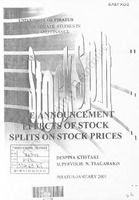The announcement effects of stock splits on stock prices

Προβολή/
Θεματική επικεφαλίδα
Stock splitting ; Stocks -- Prices ; Μετοχές -- Τιμές ; Κεφαλαιαγορά -- Ελλάδα ; Capital market -- GreeceΠερίληψη
Listed firms often decide to split their stock, in which case they increase the number of shares outstanding by distributing more shares as dividends and adjusting respectively the nominal price of the stock, leaving however the total capital unaffected. In theory a stock split is merely an accounting change, which leaves investors no better or worse off than they were before the split. Yet stock splits are a relatively common corporate event. This implies that there must be some benefit either real or perceived that results from firms splitting their stock. Survey evidence indicates that managers split their stock to get the stock's price into some optimal trading range (Baker and Gallagher (1980)). Managers believe this will attract small investors, which implies managers believe that splitting their firm's stock has implications for the firm's ownership structure. As we will see in the literature review that will follow, evidence exists that stock splits by U.S. firms are associated with positive abnormal returns around the announcement date and the day the stock split is realized. Also, there is an increase in variance following the ex-day. The purpose of this paper is not to explain why managers decide to split their firm's stock, but rather to examine the market reaction to stock splits using a set of Greek firms, and especially to give further insight on the announcement effect. This paper contributes to the literature in the sense that it extends the international empirical evidence on stock splits to the Greek capital market and also provides additional insight into the relative explanation power of the existing theories.


